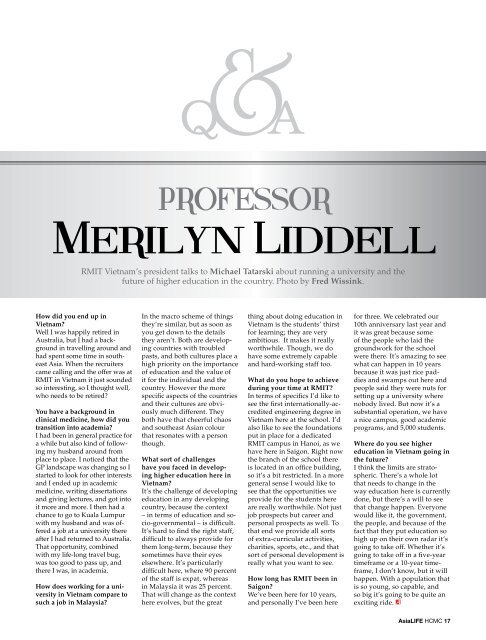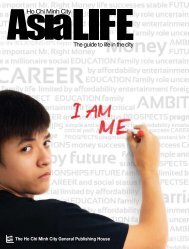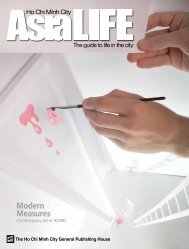Create successful ePaper yourself
Turn your PDF publications into a flip-book with our unique Google optimized e-Paper software.
RMIT Vietnam’s president talks to Michael Tatarski about running a university and thefuture of higher education in the country. Photo by Fred Wissink.How did you end up inVietnam?Well I was happily retired inAustralia, but I had a backgroundin travelling around andhad spent some time in southeastAsia. When the recruiterscame calling and the offer was atRMIT in Vietnam it just soundedso interesting, so I thought well,who needs to be retired?You have a background inclinical medicine, how did youtransition into academia?I had been in general practice fora while but also kind of followingmy husband around fromplace to place. I noticed that theGP landscape was changing so Istarted to look for other interestsand I ended up in academicmedicine, writing dissertationsand giving lectures, and got intoit more and more. I then had achance to go to Kuala Lumpurwith my husband and was offereda job at a university thereafter I had returned to Australia.That opportunity, combinedwith my life-long travel bug,was too good to pass up, andthere I was, in academia.How does working for a universityin Vietnam compare tosuch a job in Malaysia?In the macro scheme of thingsthey’re similar, but as soon asyou get down to the detailsthey aren’t. Both are developingcountries with troubledpasts, and both cultures place ahigh priority on the importanceof education and the value ofit for the individual and thecountry. However the morespecific aspects of the countriesand their cultures are obviouslymuch different. Theyboth have that cheerful chaosand southeast Asian colourthat resonates with a personthough.What sort of challengeshave you faced in developinghigher education here inVietnam?It’s the challenge of developingeducation in any developingcountry, because the context– in terms of education and socio-governmental– is difficult.It’s hard to find the right staff,difficult to always provide forthem long-term, because theysometimes have their eyeselsewhere. It’s particularlydifficult here, where 90 percentof the staff is expat, whereasin Malaysia it was 25 percent.That will change as the contexthere evolves, but the greatthing about doing education inVietnam is the students’ thirstfor learning; they are veryambitious. It makes it reallyworthwhile. Though, we dohave some extremely capableand hard-working staff too.What do you hope to achieveduring your time at RMIT?In terms of specifics I’d like tosee the first internationally-accreditedengineering degree inVietnam here at the school. I’dalso like to see the foundationsput in place for a dedicatedRMIT campus in Hanoi, as wehave here in Saigon. Right nowthe branch of the school thereis located in an office building,so it’s a bit restricted. In a moregeneral sense I would like tosee that the opportunities weprovide for the students hereare really worthwhile. Not justjob prospects but career andpersonal prospects as well. Tothat end we provide all sortsof extra-curricular activities,charities, sports, etc., and thatsort of personal development isreally what you want to see.How long has RMIT been inSaigon?We’ve been here for 10 years,and personally I’ve been herefor three. We celebrated our10th anniversary last year andit was great because someof the people who laid thegroundwork for the schoolwere there. It’s amazing to seewhat can happen in 10 yearsbecause it was just rice paddiesand swamps out here andpeople said they were nuts forsetting up a university wherenobody lived. But now it’s asubstantial operation, we havea nice campus, good academicprograms, and 5,000 students.Where do you see highereducation in Vietnam going inthe future?I think the limits are stratospheric.There’s a whole lotthat needs to change in theway education here is currentlydone, but there’s a will to seethat change happen. Everyonewould like it, the government,the people, and because of thefact that they put education sohigh up on their own radar it’sgoing to take off. Whether it’sgoing to take off in a five-yeartimeframe or a 10-year timeframe,I don’t know, but it willhappen. With a population thatis so young, so capable, andso big it’s going to be quite anexciting ride.asialife HCMC 17















